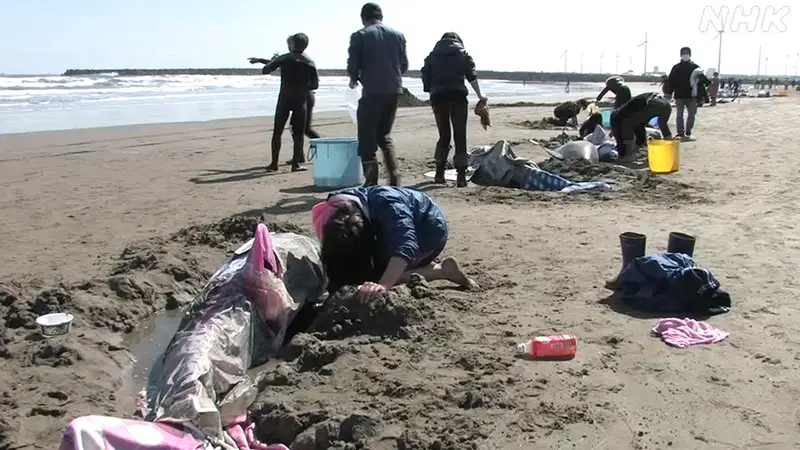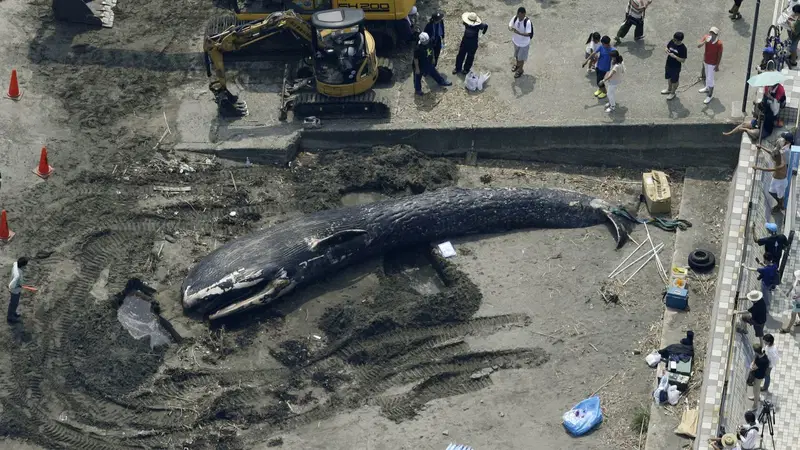On July 30, 2025, a massive 8.7 magnitude earthquake struck off the coast of Russia’s Kamchatka Peninsula, prompting widespread tsunami warnings across the Pacific—Japan included. Though the tsunami’s impact was minimal, with wave heights reaching around 60 centimeters in areas like Hokkaido and Ibaraki, what followed left communities and experts alike deeply unsettled.
In Tateyama City, Chiba Prefecture, residents awoke to a harrowing sight: several whales had washed ashore—some already dead, others struggling. The eerie scene quickly drew crowds, media coverage, and the attention of marine scientists trying to make sense of the phenomenon.

Why Do Whales Wash Ashore?
While mass strandings of whales aren’t new, the timing—just hours after a powerful undersea quake—raises difficult questions. Experts are considering several possible explanations:
Tsunami Suction Effects
Tsunamis can cause dramatic shifts in water levels along coastlines. As water rapidly recedes before the wave hits, marine animals like whales near shore may get caught in the pull and left stranded.
“It’s like pulling the plug on a bathtub,” said a marine biologist from the University of Tokyo. “Objects near the edge are drawn downward.”
????#BREAKING: Now, at least four whales have washed ashore along Japan’s coastline, just hours after a massive 8.8-magnitude earthquake rocked the region triggering tsunami Warnings watches and advisories pic.twitter.com/Res680IpSn
— R A W S A L E R T S (@rawsalerts) July 30, 2025
Disturbed Echolocation
Whales rely heavily on echolocation to navigate, but seismic events can interfere with underwater sound propagation and pressure patterns. A powerful quake might distort their internal sense of direction, leading them to swim toward land instead of away from it.
Social Behavior and the Domino Effect
Whales are deeply social animals. When one becomes disoriented or beached, others in the pod often follow in an instinctive show of solidarity—sometimes resulting in mass strandings.
Harbingers or Coincidence?
In Japanese tradition, unusual animal behavior—like whale strandings—is often interpreted as a celestial warning. Before the devastating 2011 Tōhoku earthquake and tsunami, similar reports of strange animal behavior and mass marine strandings were documented.
Yet scientific evidence linking whale strandings to the ability to sense earthquakes remains inconclusive. While whales are known to be sensitive to environmental changes, there’s no proven link suggesting they can predict seismic activity.
Still, some believe the ocean is sending a message.
Just six days before the 2011 quake, roughly 50 dolphins were found beached along the coast of Ibaraki Prefecture. That moment—and this one—serve as haunting reminders of how nature often reacts in complex and mysterious ways.

Climate Change: The Unseen Force?
Beyond earthquakes, climate change may also be a silent driver behind these events. Rising ocean temperatures, shifting currents, and increasing noise pollution from human activity are drastically altering whale migration routes and behavior.
Such disruptions can guide whales into unfamiliar or shallow waters, putting them at greater risk of stranding. Coastal areas in Japan, New Zealand, and Australia have all seen an uptick in such incidents in recent years.
Experts emphasize that the mass stranding of blue whales in Japan is exceptionally rare—and likely tied to multiple overlapping natural and behavioral causes.
A Call from the Deep
The image of lifeless whales stretched across Japan’s sandy shores is more than tragic—it’s symbolic. Whether viewed as a spiritual omen or a stark environmental warning, it underscores the fragile balance between humanity and the natural world.
We may not yet fully grasp why these intelligent, majestic beings come ashore in times like this. But one thing is certain: when the ocean speaks, it’s up to us to pay attention.
If we ignore these signs—be they scientific or symbolic—we may find ourselves facing far deeper consequences than a beach full of stranded whales.
